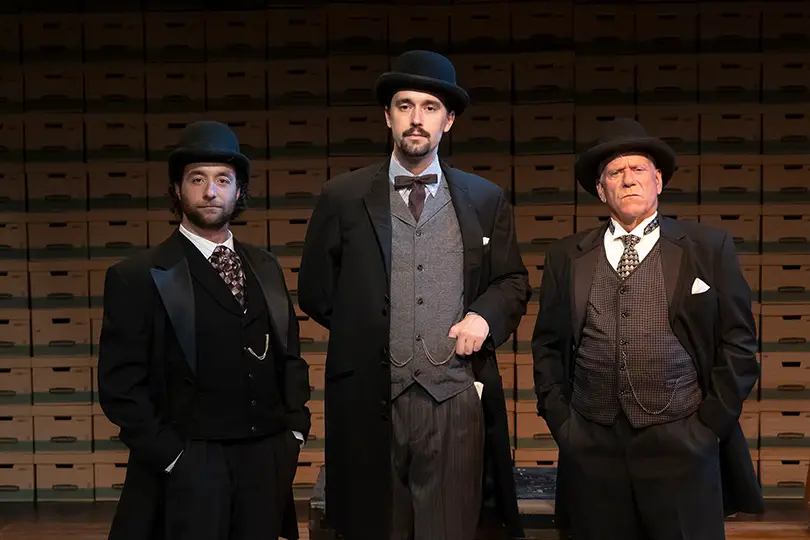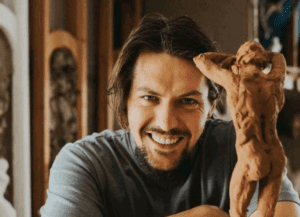If the name Lehman Brothers sounds familiar, it’s because the Lehman Brothers Inc. triggered one of the biggest economic crises in history when it went bankrupt in 2008.

But 175 years ago, the name belonged to three brothers who immigrated from Bavaria and landed in Alabama with no money: just dreams for a better future.
“The Lehman Trilogy,” now playing at Capital Stage, traces the story arc from the brothers’ beginnings to the financial institution’s catastrophic downfall; from three brothers who gained momentum in the Southern cotton trade, to the creation of a firm with a seat on the New York Stock Exchange.
The term trilogy in the play’s title is apt — three brothers, three centuries, told in three acts over three hours.
“The Lehman Trilogy”, written in Italian by Stefano Massini, was originally five hours long. This English adaptation by Ben Power, which won the 2022 Tony Award for Best Play, is three hours and 20 minutes with two intermissions.
It’s lengthy, with captivating stories, impressive performances and impactful production elements, though a couple script adjustments along the way would help.
Under the careful direction of Michael Stevenson, the three performers — Matt K. Miller, Jackson Goldberg and Andrew Fridae — capture the essence of the three brothers and their Jewish heritage.
The three cast members are an A team, coordinating scenes and personalities, different backgrounds and accents, ages and genders. The production elements are very creative — financial file boxes create a back wall where shadow pictures and videos depict ships, docks, buildings, towns and cities. And it’s a wise choice to keep the costumes, sets and props simple, to let the story lead the way.
“The Lehman Trilogy” is presented in a unique combination of first-person dialogue and third-person narration, with actors sometimes speaking to the audience and other times exchanging dialogue.
This works well in Act 1, where the brothers’ agricultural and company history is told. However, the act could be edited down to shorten the overall play. And a clarification added that the Lehman brothers, the kings of cotton, owned slaves who produced their crops.
Act 2 shows the handoff to the next generation, where money is the new crop, weaving the road from humble beginnings through the historic touchstones of WWI, WWII, and the Great Depression. And it eventually leads to its worldwide financial expansion when the family sells the company off.
Act 3 loses the overall momentum when presented in financial jargon with little character development and little reference to how their poor decisions affected so many people.
Overall, “The Lehman Trilogy” is a fascinating and intriguing story of how a capitalistic endeavor grew to become such a commodity to companies, investors, politicians and ordinary individuals. And how the simple dreams of three brothers took a dark turn centuries later.
“The Lehman Trilogy” plays through Sept 28; Wed-Fri, 7 p.m., Sat, 2 p.m. and 8 p.m., Sun 2 p.m. 2215 J St. Capital Stage.
This story is part of the Solving Sacramento journalism collaborative. This story was funded by the City of Sacramento’s Arts and Creative Economy Journalism Grant to Solving Sacramento. Following our journalism code of ethics, the city had no editorial influence over this story. Our partners include California Groundbreakers, Capital Public Radio, Hmong Daily News, Outword, Russian America Media, Sacramento Business Journal, Sacramento News & Review and Sacramento Observer. Sign up for our “Sac Art Pulse” newsletter here.
By Patti Roberts















